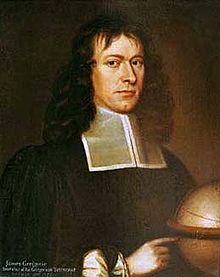James Gregory | |
|---|---|
 James Gregory (1638–1675) | |
| Born | November 1638 Drumoak, Aberdeenshire, Scotland |
| Died | October 1675 (aged 36) Edinburgh, Scotland |
| Nationality | Scottish |
| Citizenship | Scotland |
| Alma mater | Marischal College, University of Aberdeen University of Padua |
| Known for | Gregorian telescope Gregory coefficients Diffraction grating Fundamental theorem of the calculus Integral of the secant function |
| Scientific career | |
| Fields | Mathematics Astronomy |
| Institutions | University of St. Andrews University of Edinburgh |
| Notes | |
James Gregory FRS (November 1638 – October 1675) was a Scottish mathematician and astronomer. His surname is sometimes spelt as Gregorie, the original Scottish spelling. He described an early practical design for the reflecting telescope – the Gregorian telescope – and made advances in trigonometry, discovering infinite series representations for several trigonometric functions.
In his book Geometriae Pars Universalis (1668)[1] Gregory gave both the first published statement and proof of the fundamental theorem of the calculus (stated from a geometric point of view, and only for a special class of the curves considered by later versions of the theorem), for which he was acknowledged by Isaac Barrow.[2][3][4][5][6][7][8]
- ^ Gregory, James (1668). Geometriae Pars Universalis. Museo Galileo: Patavii: typis heredum Pauli Frambotti.
- ^ William Johnston Associate Dean of the College and Stodghill Professor of Mathematics Centre College; Alex McAllister Associate Professor of Mathematics Centre College (26 June 2009). A Transition to Advanced Mathematics : A Survey Course: A Survey Course. Oxford University Press. pp. 329–. ISBN 978-0-19-971866-5.
- ^ Edmund F. Robertson. James Gregory: Regius Professor of Mathematics.
- ^ Michael Nauenberg. Barrow and Leibniz on the fundamental theorem of the calculus.
- ^ Andrew Leahy. A Euclidean Approach to the FTC – Gregory's Proof of the FTC.
- ^ Ethan D. Bloch. The Real Numbers and Real Analysis, pg. 316.
- ^ Roger L. Cooke (14 February 2011). The History of Mathematics: A Brief Course. John Wiley & Sons. pp. 467–. ISBN 978-1-118-03024-0.
- ^ D. J. Struik. A Source Book in Mathematics, 1200-1800. Harvard University Press. pp. 262–. ISBN 978-0-674-82355-6.